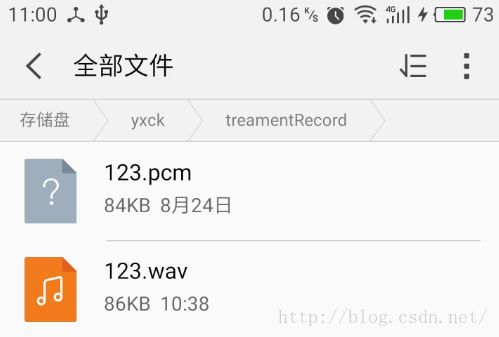- ios如何像android那样不上架安装
ios上架
大家都知道像鸿蒙、安卓的安装是比较简单的,可以直接在android或华为手机上安装,不一定通过在线商店安装。但是ios手机不一样,假如你是使用普通苹果账号打包的appstore类型的ipa包,是无法直接安装在ios手机的,必须通过上架才能安装。不过,ios想直接安装,还是有通道的,就是注册苹果企业开发者账号,通过企业开发者账号,生成inhouse类型的证书和描述文件(证书profile文件),通过
- python+flask计算机毕业设计基于Android平台的景区移动端旅游软件系统(程序+开题+论文)
Node.js彤彤 程序
pythonflask课程设计
本系统(程序+源码+数据库+调试部署+开发环境)带论文文档1万字以上,文末可获取,系统界面在最后面。系统程序文件列表开题报告内容研究背景随着移动互联网技术的飞速发展,智能手机已成为人们日常生活中不可或缺的一部分,特别是在旅游领域,移动端应用以其便捷性、实时性和个性化服务的特点,极大地改变了人们的旅游体验方式。当前,旅游市场日益繁荣,游客对于旅游信息获取、行程规划、景点导航、票务预订及个性化服务的需
- 【FAQ】HarmonyOS SDK 闭源开放能力 —Push Kit(10)
1.问题描述:离线推送,锁屏的时候没有弹出消息,只有下拉在通知中心里面显示。请问是否是正常的?解决方案:检查一下是否存在图片风控:https://developer.huawei.com/consumer/cn/doc/harmonyos-refere...2.问题描述:1.请问纯鸿蒙系统的远程推送,自分配如何配置?2、纯鸿蒙系统的远程推送,有没有高透传?3、Android华为推送如果切到鸿蒙推送
- APP怎么抓取原生日志 - Android篇
大汉堡玩测试
android功能测试
文章目录前言为什么要抓原生页面的日志举一个抓取原生日志的例子AndroidDebugBridge(ADB)安装ADB连接设备验证连接抓取日志注意点总结前言好困~写点我觉得重要的吧,IOS和HarmonyOSNEXT这周写为什么要抓原生页面的日志原生日志能够捕捉到与操作系统和应用框架交互的关键信息,包括性能瓶颈、崩溃报告和安全事件等,而这些是纯H5日志无法提供的,确保了对应用行为的全面监控和精准调试
- 【typescript进阶篇】(第四章) webpack编译ts及第三方库声明文件
蒜香拿铁
typescript系列typescriptwebpackjavascript
使用webpack打包TS文件安装依赖安装webpack环境npmiwebpackwebpack-cliwebpack-dev-server-D安装TypeScriptnpminstalltypescript-D编译TSnpminstallts-loader-D热更新服务npminstallwebpack-dev-server-DHTML模板npminstallhtml-webpack-plugi
- RK35XX(3568) Android WSL ubuntu22.04 编译环境配置
hmbbPdx_
firefly-RK3288RK驱动开发Rk开发(RK3568)androidlinux
前言:装Ubuntu真机操作是很流畅但是没什么软件,装Vmware虚拟机操作卡顿配置也麻烦。那不如试一试wsl吧,命令行操作,流程又快捷wsl简介:适用于Linux的Windows子系统可让开发人员按原样运行GNU/Linux环境-包括大多数命令行工具、实用工具和应用程序-且不会产生传统虚拟机或双启动设置开销。window版本:10或11(7不支持)Ubuntu:16.04~22.04.1WSL:
- [C/C++][VsCode]使用VsCode在Linux上开发和Vscode在线调试
★Orange★
LinuxC++嵌入式c语言c++vscode
目录0.前言1.win10上搭建环境Linux环境2.编写makefile3.怎么在线调试结语0.前言在开发中,可以一边开发一边调试,这样可以大大的减少bug;但是正常来说一个大点的项目,是不太可能单步调试的,因为一般都是用make或者CMake,甚至安卓中的Android.bp来编译;因此检查调试程序,仅能通过编译后,烧录到目标板子上或者搭建好的环境上,根据Log信息来调试,这样确实有点麻烦,但
- eclipse中修改svn账号密码
漫漫求索者
开发笔记eclipssvn账号密码JaveHL
背景:鉴于单位的邮箱密码定时更换,svn账号又跟邮箱账号绑定,所以每次都需要改svn账号密码,最近由于一直在用androidstudio开放,偶然接触到之前的eclipse项目,想打开一下,却发现svn密码不能用了,想着改下密码,却忘了怎么修改了,教训,还是记录一下吧。步骤如下:1、首先看一下自己eclipse用的是那个版本的SVN,在windows>preference>Team>SVN在右边的
- Android Compose 图标按钮深度剖析:从源码到实践(四)
&有梦想的咸鱼&
Android开发大全AndroiodCompose原理android
AndroidCompose图标按钮深度剖析:从源码到实践一、引言在现代Android应用开发中,用户界面的交互性和美观性至关重要。图标按钮作为一种常见的UI元素,以其简洁直观的特点,在提升用户体验方面发挥着重要作用。AndroidCompose作为Google推出的新一代声明式UI工具包,为开发者提供了创建图标按钮的便捷方式。本文将深入AndroidCompose框架的图标按钮模块,从源码级别进
- 一文梳理清楚Vsync/Choreographer/SurfaceFlinger/Surface/SurfaceHolder/硬件刷新频率关系
lpftobetheone
android
在Android应用开发中,流畅的UI体验是用户感知的核心。为了实现这一点,Android系统构建了一套复杂的图形渲染架构,涉及垂直同步信号(VSync)、编舞者(Choreographer)、硬件刷新频率、SurfaceFlinger、Surface和SurfaceHolder等多个关键组件。本文将深入解析这些组件的关系与工作流程,帮助你全面理解Android图形渲染的核心机制。总结起来,整个流
- 【Android 】零基础到飞升 | Git之使用GitHub搭建远程仓库
A little strawberry
gitjavagithubpython编程语言
1.5.2Git之使用GitHub搭建远程仓库本节引言:在上一节中,我们学习了如何使用Git,构建我们的本地仓库,轻松的实现了版本控制以及代码还原,修改日志查看等;读者肯定不满足与本地是吧,假如是多个人一起来开发一个程序呢?我们需要一个作为服务器的远程仓库!当然搭建一个服务器是需要成本的,为什么不把项目托管到Github上呢?作为开源代码库以及版本控制系统,Github拥有140多万开发者用户。随
- Kotlin第十六讲---实战通过委托完成SharedPreferences封装
奇舞移动
jscssjava编程语言javascript
内容简介前面讲解了Kotlin具有类委托和属性委托。接下来我给大家分享1个实战技巧,使用属性委托来完成SharedPreferences的封装。前景介绍说起SharedPreferences在Android中是一种常用的本地化存储数据的方案。以前Java封装都是将SharedPreferences封装成单利,原因就是SharedPreferences对象创建过程会解析xml文件,这个过程比较耗性能
- 从 0 开始使用 cursor 开发一个移动端跨平台应用程序
沐怡旸
reactnative
1.安装必要的工具和环境在开始之前,确保你的开发环境已经安装了以下工具:a.安装Node.js和npmReactNative依赖Node.js和npm(NodePackageManager)。你可以从Node.js官网下载并安装最新版本。b.安装PythonReactNative的Android开发需要Python。确保你已经安装了Python2.7或Python3.x。c.安装Java环境Rea
- Android 扫码 - 集成 zxing-android-embedded
我命由我12345
Android-简化库编程androidjava-eejava安卓android-studioandroidstudioandroidjetpack
一、zxing-android-embedded1、ZXing概述ZXing是谷歌开源的让开发者更方便使用摄像头的库,而常用的扫码功能就是其中之一第三方ZXing库zxing-android-embedded,抽取其中的扫码功能单独使用2、基本使用(1)依赖与权限配置在项目级build.gradle中配置相关依赖implementation'com.journeyapps:zxing-androi
- 开源模型应用落地-qwen模型小试-调用Qwen2-7B-Instruct-进阶篇(十二)
开源技术探险家
开源模型-实际应用落地#深度学习自然语言处理语言模型
一、前言经过前五篇“qwen模型小试”文章的学习,我们已经熟练掌握qwen大模型的使用。然而,就在前几天阿里云又发布了Qwen2版本。无论是语言模型还是多模态模型,均在大规模多语言和多模态数据上进行预训练,并通过高质量数据进行后期微调以贴近人类偏好。本文将介绍如何使用Transformers库进行模型推理(相较于qwen1系列,使用方式上有较大的调整),现在,我们赶紧跟上脚步,去体验一下新版本模型
- Flutter 适配HarmonyOS NEXT:调用原生功能实现相册选取与拍照
Flutter适配鸿蒙系统:调用原生功能实现相册选取与拍照项目背景我们的移动端项目基于Flutter开发,为控制开发周期与成本,采用了HarmonyOSNEXT(简称鸿蒙)的Flutter兼容库,并更新了部分三方库为鸿蒙的Flutter兼容库。在图片视频选择与拍摄功能上,我们之前调用的是Android和iOS的原生方法,现在需要为鸿蒙开发一套原生配合使用的方案。遇到的问题鸿蒙的Flutter兼容库
- mysql 统计同一字段不同值的个数
liudachu
Mysql数据库mysql
在一个项目中,制作呃echart图表的时候,遇到一个需求,需要从后端接口获取数据----售票员的姓名和业绩所以需要在订单表中,获取不同售票员的订单数量。订单表解决方案汇总MySQL统计一个列中不同值的数量需求:MySQL统计一个列中不同值的数量,其中origin是用户来源,其中的值有iPhone、Android、Web三种,现在需要分别统计由这三种渠道注册的用户数量。方案1:SELECTcount
- UNI-APP+VUE3+VITE+VSCode开发经验及填坑记录(持续更新ING)
集成显卡
前端项目实践uni-appvscodeide
uni-app是一个使用Vue.js开发所有前端应用的框架,开发者编写一套代码,可发布到iOS、Android、Web(响应式)、以及各种小程序(微信/支付宝/百度/头条/飞书/QQ/快手/钉钉/淘宝)、快应用等多个平台。快速开发模板unibest:最好的uniapp开发框架,由uniapp+Vue3+Ts+Vite5+UnoCss+VSCode(可选webstorm)+uni插件+wot-ui(
- Android开发
哈哈哈隔
android
AndroidAdapter是将数据绑定到UI界面上的桥接类比如:当lambada中只有一个参数时,可以用it指代@Target和@Retention是由Java提供的元注解,所谓元注解就是标记其他注解的注解,下面分别介绍https://blog.csdn.net/javazejian/article/details/71860633#%E5%A3%B0%E6%98%8E%E6%B3%A8%E8%
- HarmonyOS开发5.0【应用程序包】
爱桥代码的程序媛
鸿蒙开发学习笔录harmonyos分布式鸿蒙开发鸿蒙鸿蒙系统openharmony程序包
对比HarmonyOS与Android的应用程序包HarmonyOS的应用程序包与Android的应用程序包在多个方面存在一些不同之处,主要体现的方面:包格式(从包的后缀名可以看出来)HarmonyOS:使用.hap格式作为应用程序包。这个格式是HarmonyOS的专有格式,包含了应用的所有资源和代码。Android:使用.apk格式作为应用程序包。APK文件包含了应用的代码、资源、清单文件等。架
- android MutableLiveData setValue 响应速速 postValue 快
mmsx
Android常用开发技术androidlivedata
MutableLiveData是LiveData的一个可变版本,常用于在ViewModel中保存和管理UI相关的数据。MutableLiveData提供了两种主要的方法来更新其值:setValue和postValue。关于这两者的响应速度,通常认为setValue比postValue更快。下面详细解释这两者的区别以及影响响应速度的因素。一、setValuevspostValue1.setValue
- Demo发布- ClkLog客户端集成 uni-app
sdk开源软件数据分析埋点
前言在上一期推文中【Demo发布-ClkLog客户端集成-ReactNative】,我们与大家分享了ReactNative的集成demo。本期,我们将继续介绍ClkLog集成uni-app的demo。uni-app允许开发者编写一套代码,然后可以编译到iOS、Android、H5以及各种小程序等多个平台。因此,本次demo中将涵盖上述所有平台,并且我们会详细说明集成过程中遇到的难点及解决方案。un
- Demo发布 | ClkLog成功集成Unity3D
前言在Clklog完成ReactNative和uni-app集成Demo后,一个游戏行业新客户提出了使用Unity3D开发的集成问题。对此,我们与客户分别进行了测试。客户使用神策Andriod原生SDK在Android端暴露接口给Unity3D的方式,验证了使用ClkLog进行数据采集的可行性。同时,ClkLog联合合作伙伴对神策Unity3DSDK(安卓端、IOS端、MacOS)进行了深入测试,
- 基于图像比对的跨平台UI一致性校验工具开发全流程指南——Android/iOS/Web三端自动化测试实战
追寻向上
uiandroidios
一、需求背景与方案概述1.1为什么需要跨平台UI校验?在移动互联网时代,同一产品需覆盖Android、iOS和Web三端。由于不同平台的开发框架(如Android的MaterialDesign与iOS的Cupertino风格)及渲染引擎差异,UI界面易出现以下问题:布局错位:按钮位置偏移、文本换行不一致视觉差异:颜色色差、字体粗细不同交互逻辑冲突:滑动方向、弹窗动画不一致传统人工测试效率低且易遗漏
- 【Flutter】从安卓与iOS包体优化到一键自动打包脚本的一条龙服务
sugood
Flutterandroidflutterios
系统信息Systemversion:MacOS12Flutterversion:1.22.5Dartversion:2.10.4AndroidStudioversion:4.1.1介绍APK优化包体大小APK多渠道打包APK一键打包脚本IPA优化包体大小IPA无签名打包IPA一键打包脚本脚本地址github脚本地址安卓APK优化包体大小优化图片等资源大小,删除无用资源只选择保留必要的so库。第三方
- 纯血鸿蒙系统 HarmonyOS NEXT自动化测试实践
夜阑卧听风吹雨,铁马冰河入梦来
pythonAppium自动化测试harmonyos华为
1、测试框架选择hdc:类似android系统的adb命令,提供设备信息查询,包管理,调试相关的命令@ohos.UiTest:鸿蒙sdk的一部分,类似androidsdk里的uiautomator,基于Accessibility服务,提供模拟UI操作的能力。但是需要用arkTS语言来写自动化case,并且用例需要打包到被测app里面hypium:鸿蒙官方的自动化框架,功能比较完善,可以基于pyth
- Python for Android 安装和配置指南
舒欣和Queenly
PythonforAndroid安装和配置指南python-for-androidTurnyourPythonapplicationintoanAndroidAPK项目地址:https://gitcode.com/gh_mirrors/py/python-for-android1.项目基础介绍和主要编程语言项目基础介绍PythonforAndroid(p4a)是一个开源工具,旨在将Python应用
- 用旧的手机搭建 MQTT Broker-Node_red
君零渊
单片机
MQTTBroker搭建在Android上搭建MQTT所需工具:termux通过网盘分享的文件:termux-app_v0.118.1+github-debug_armeabi-v7a.apk链接:https://pan.baidu.com/s/1Iii2szXAc02cKVGdP1EuzQ?pwd=fqsc提取码:fqsc在Termux中使用MQTT(MessageQueuingTelemetr
- httpcanary小米 闪退_Android HttpCanary最强抓包工具!
ssslience
httpcanary小米闪退
迎使用HttpCanary——最强Android抓包工具!HttpCanary是一款功能强大的HTTP/HTTPS/HTTP2网络包抓取和分析工具,你可以把他看成是移动端的Fiddler或者Charles,但是HttpCanary使用起来更加地简单容易,因为它是专门为移动端设计的!最重要的是:无需root权限!无需root权限!无需root权限!HttpCanary支持对HTTP协议包的抓取和注入
- HarmonyOS NEXT 用户首选项(Preferences)在应用开发中的应用与机制
架构教育
在移动应用开发中,用户首选项(Preferences)是一种常见的数据存储方式,用于保存用户的个性化设置或应用的配置信息。类似于Android中的SharedPreferences,Preferences以键值对(Key-Value)的形式将数据存储在应用的内存和本地文件中。本文将详细介绍Preferences的概念、运作机制、API使用以及相关的限制。一、用户首选项(Preferences)的概
- mondb入手
木zi_鸣
mongodb
windows 启动mongodb 编写bat文件,
mongod --dbpath D:\software\MongoDBDATA
mongod --help 查询各种配置
配置在mongob
打开批处理,即可启动,27017原生端口,shell操作监控端口 扩展28017,web端操作端口
启动配置文件配置,
数据更灵活
- 大型高并发高负载网站的系统架构
bijian1013
高并发负载均衡
扩展Web应用程序
一.概念
简单的来说,如果一个系统可扩展,那么你可以通过扩展来提供系统的性能。这代表着系统能够容纳更高的负载、更大的数据集,并且系统是可维护的。扩展和语言、某项具体的技术都是无关的。扩展可以分为两种:
1.
- DISPLAY变量和xhost(原创)
czmmiao
display
DISPLAY
在Linux/Unix类操作系统上, DISPLAY用来设置将图形显示到何处. 直接登陆图形界面或者登陆命令行界面后使用startx启动图形, DISPLAY环境变量将自动设置为:0:0, 此时可以打开终端, 输出图形程序的名称(比如xclock)来启动程序, 图形将显示在本地窗口上, 在终端上输入printenv查看当前环境变量, 输出结果中有如下内容:DISPLAY=:0.0
- 获取B/S客户端IP
周凡杨
java编程jspWeb浏览器
最近想写个B/S架构的聊天系统,因为以前做过C/S架构的QQ聊天系统,所以对于Socket通信编程只是一个巩固。对于C/S架构的聊天系统,由于存在客户端Java应用,所以直接在代码中获取客户端的IP,应用的方法为:
String ip = InetAddress.getLocalHost().getHostAddress();
然而对于WEB
- 浅谈类和对象
朱辉辉33
编程
类是对一类事物的总称,对象是描述一个物体的特征,类是对象的抽象。简单来说,类是抽象的,不占用内存,对象是具体的,
占用存储空间。
类是由属性和方法构成的,基本格式是public class 类名{
//定义属性
private/public 数据类型 属性名;
//定义方法
publ
- android activity与viewpager+fragment的生命周期问题
肆无忌惮_
viewpager
有一个Activity里面是ViewPager,ViewPager里面放了两个Fragment。
第一次进入这个Activity。开启了服务,并在onResume方法中绑定服务后,对Service进行了一定的初始化,其中调用了Fragment中的一个属性。
super.onResume();
bindService(intent, conn, BIND_AUTO_CREATE);
- base64Encode对图片进行编码
843977358
base64图片encoder
/**
* 对图片进行base64encoder编码
*
* @author mrZhang
* @param path
* @return
*/
public static String encodeImage(String path) {
BASE64Encoder encoder = null;
byte[] b = null;
I
- Request Header简介
aigo
servlet
当一个客户端(通常是浏览器)向Web服务器发送一个请求是,它要发送一个请求的命令行,一般是GET或POST命令,当发送POST命令时,它还必须向服务器发送一个叫“Content-Length”的请求头(Request Header) 用以指明请求数据的长度,除了Content-Length之外,它还可以向服务器发送其它一些Headers,如:
- HttpClient4.3 创建SSL协议的HttpClient对象
alleni123
httpclient爬虫ssl
public class HttpClientUtils
{
public static CloseableHttpClient createSSLClientDefault(CookieStore cookies){
SSLContext sslContext=null;
try
{
sslContext=new SSLContextBuilder().l
- java取反 -右移-左移-无符号右移的探讨
百合不是茶
位运算符 位移
取反:
在二进制中第一位,1表示符数,0表示正数
byte a = -1;
原码:10000001
反码:11111110
补码:11111111
//异或: 00000000
byte b = -2;
原码:10000010
反码:11111101
补码:11111110
//异或: 00000001
- java多线程join的作用与用法
bijian1013
java多线程
对于JAVA的join,JDK 是这样说的:join public final void join (long millis )throws InterruptedException Waits at most millis milliseconds for this thread to die. A timeout of 0 means t
- Java发送http请求(get 与post方法请求)
bijian1013
javaspring
PostRequest.java
package com.bijian.study;
import java.io.BufferedReader;
import java.io.DataOutputStream;
import java.io.IOException;
import java.io.InputStreamReader;
import java.net.HttpURL
- 【Struts2二】struts.xml中package下的action配置项默认值
bit1129
struts.xml
在第一部份,定义了struts.xml文件,如下所示:
<!DOCTYPE struts PUBLIC
"-//Apache Software Foundation//DTD Struts Configuration 2.3//EN"
"http://struts.apache.org/dtds/struts
- 【Kafka十三】Kafka Simple Consumer
bit1129
simple
代码中关于Host和Port是割裂开的,这会导致单机环境下的伪分布式Kafka集群环境下,这个例子没法运行。
实际情况是需要将host和port绑定到一起,
package kafka.examples.lowlevel;
import kafka.api.FetchRequest;
import kafka.api.FetchRequestBuilder;
impo
- nodejs学习api
ronin47
nodejs api
NodeJS基础 什么是NodeJS
JS是脚本语言,脚本语言都需要一个解析器才能运行。对于写在HTML页面里的JS,浏览器充当了解析器的角色。而对于需要独立运行的JS,NodeJS就是一个解析器。
每一种解析器都是一个运行环境,不但允许JS定义各种数据结构,进行各种计算,还允许JS使用运行环境提供的内置对象和方法做一些事情。例如运行在浏览器中的JS的用途是操作DOM,浏览器就提供了docum
- java-64.寻找第N个丑数
bylijinnan
java
public class UglyNumber {
/**
* 64.查找第N个丑数
具体思路可参考 [url] http://zhedahht.blog.163.com/blog/static/2541117420094245366965/[/url]
*
题目:我们把只包含因子
2、3和5的数称作丑数(Ugly Number)。例如6、8都是丑数,但14
- 二维数组(矩阵)对角线输出
bylijinnan
二维数组
/**
二维数组 对角线输出 两个方向
例如对于数组:
{ 1, 2, 3, 4 },
{ 5, 6, 7, 8 },
{ 9, 10, 11, 12 },
{ 13, 14, 15, 16 },
slash方向输出:
1
5 2
9 6 3
13 10 7 4
14 11 8
15 12
16
backslash输出:
4
3
- [JWFD开源工作流设计]工作流跳跃模式开发关键点(今日更新)
comsci
工作流
既然是做开源软件的,我们的宗旨就是给大家分享设计和代码,那么现在我就用很简单扼要的语言来透露这个跳跃模式的设计原理
大家如果用过JWFD的ARC-自动运行控制器,或者看过代码,应该知道在ARC算法模块中有一个函数叫做SAN(),这个函数就是ARC的核心控制器,要实现跳跃模式,在SAN函数中一定要对LN链表数据结构进行操作,首先写一段代码,把
- redis常见使用
cuityang
redis常见使用
redis 通常被认为是一个数据结构服务器,主要是因为其有着丰富的数据结构 strings、map、 list、sets、 sorted sets
引入jar包 jedis-2.1.0.jar (本文下方提供下载)
package redistest;
import redis.clients.jedis.Jedis;
public class Listtest
- 配置多个redis
dalan_123
redis
配置多个redis客户端
<?xml version="1.0" encoding="UTF-8"?><beans xmlns="http://www.springframework.org/schema/beans" xmlns:xsi=&quo
- attrib命令
dcj3sjt126com
attr
attrib指令用于修改文件的属性.文件的常见属性有:只读.存档.隐藏和系统.
只读属性是指文件只可以做读的操作.不能对文件进行写的操作.就是文件的写保护.
存档属性是用来标记文件改动的.即在上一次备份后文件有所改动.一些备份软件在备份的时候会只去备份带有存档属性的文件.
- Yii使用公共函数
dcj3sjt126com
yii
在网站项目中,没必要把公用的函数写成一个工具类,有时候面向过程其实更方便。 在入口文件index.php里添加 require_once('protected/function.php'); 即可对其引用,成为公用的函数集合。 function.php如下:
<?php /** * This is the shortcut to D
- linux 系统资源的查看(free、uname、uptime、netstat)
eksliang
netstatlinux unamelinux uptimelinux free
linux 系统资源的查看
转载请出自出处:http://eksliang.iteye.com/blog/2167081
http://eksliang.iteye.com 一、free查看内存的使用情况
语法如下:
free [-b][-k][-m][-g] [-t]
参数含义
-b:直接输入free时,显示的单位是kb我们可以使用b(bytes),m
- JAVA的位操作符
greemranqq
位运算JAVA位移<<>>>
最近几种进制,加上各种位操作符,发现都比较模糊,不能完全掌握,这里就再熟悉熟悉。
1.按位操作符 :
按位操作符是用来操作基本数据类型中的单个bit,即二进制位,会对两个参数执行布尔代数运算,获得结果。
与(&)运算:
1&1 = 1, 1&0 = 0, 0&0 &
- Web前段学习网站
ihuning
Web
Web前段学习网站
菜鸟学习:http://www.w3cschool.cc/
JQuery中文网:http://www.jquerycn.cn/
内存溢出:http://outofmemory.cn/#csdn.blog
http://www.icoolxue.com/
http://www.jikexue
- 强强联合:FluxBB 作者加盟 Flarum
justjavac
r
原文:FluxBB Joins Forces With Flarum作者:Toby Zerner译文:强强联合:FluxBB 作者加盟 Flarum译者:justjavac
FluxBB 是一个快速、轻量级论坛软件,它的开发者是一名德国的 PHP 天才 Franz Liedke。FluxBB 的下一个版本(2.0)将被完全重写,并已经开发了一段时间。FluxBB 看起来非常有前途的,
- java统计在线人数(session存储信息的)
macroli
javaWeb
这篇日志是我写的第三次了 前两次都发布失败!郁闷极了!
由于在web开发中常常用到这一部分所以在此记录一下,呵呵,就到备忘录了!
我对于登录信息时使用session存储的,所以我这里是通过实现HttpSessionAttributeListener这个接口完成的。
1、实现接口类,在web.xml文件中配置监听类,从而可以使该类完成其工作。
public class Ses
- bootstrp carousel初体验 快速构建图片播放
qiaolevip
每天进步一点点学习永无止境bootstrap纵观千象
img{
border: 1px solid white;
box-shadow: 2px 2px 12px #333;
_width: expression(this.width > 600 ? "600px" : this.width + "px");
_height: expression(this.width &
- SparkSQL读取HBase数据,通过自定义外部数据源
superlxw1234
sparksparksqlsparksql读取hbasesparksql外部数据源
关键字:SparkSQL读取HBase、SparkSQL自定义外部数据源
前面文章介绍了SparSQL通过Hive操作HBase表。
SparkSQL从1.2开始支持自定义外部数据源(External DataSource),这样就可以通过API接口来实现自己的外部数据源。这里基于Spark1.4.0,简单介绍SparkSQL自定义外部数据源,访
- Spring Boot 1.3.0.M1发布
wiselyman
spring boot
Spring Boot 1.3.0.M1于6.12日发布,现在可以从Spring milestone repository下载。这个版本是基于Spring Framework 4.2.0.RC1,并在Spring Boot 1.2之上提供了大量的新特性improvements and new features。主要包含以下:
1.提供一个新的sprin
